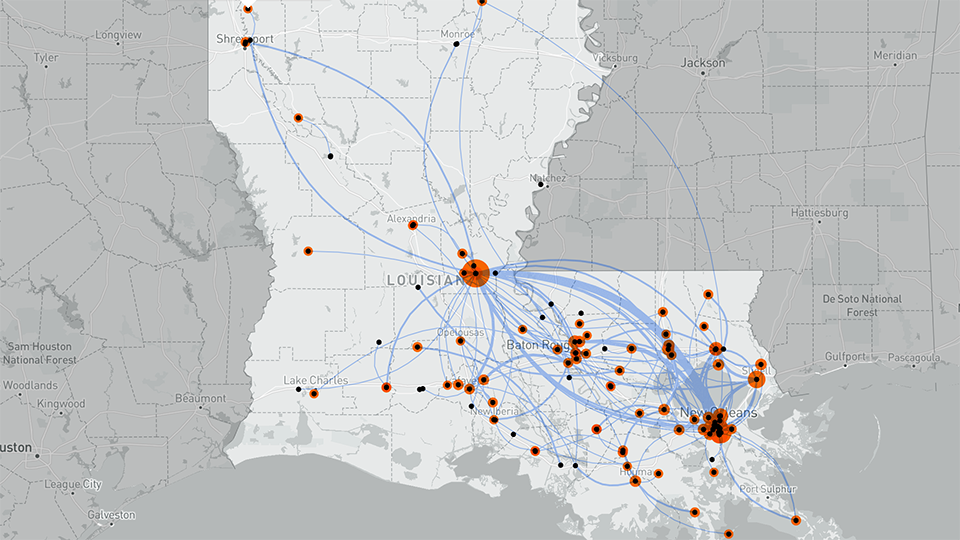How Structuring Data Unburies Critical Louisiana Police Misconduct Data
 In Orleans Parish, Louisiana, home of New Orleans, 78 percent of wrongful convictions have been linked to a police officer’s failure to share exculpatory evidence with the defense. This is a rate more than double the national average.But while these actions, or any misconduct, by law enforcement personnel may be recorded officially, the data may be difficult to use or find. Depending on a parish’s resources, the data may be archived in a non-digital format, for example, on paper.
In Orleans Parish, Louisiana, home of New Orleans, 78 percent of wrongful convictions have been linked to a police officer’s failure to share exculpatory evidence with the defense. This is a rate more than double the national average.But while these actions, or any misconduct, by law enforcement personnel may be recorded officially, the data may be difficult to use or find. Depending on a parish’s resources, the data may be archived in a non-digital format, for example, on paper.
Innocence Project New Orleans (IPNO) has as its mission the overturning of wrongful convictions in Louisiana. A police officer involved in a wrongful conviction may have a history of misconduct or may have failed to share exculpatory evidence—and that information is critical to the exoneration process. But how can a grassroots organization like IPNO sort through thousands of undigitized files to identify information that can be useful?
When HRDAG data scientist Tarak Shah joined forces with IPNO’s Ayyub Ibrahim and colleagues, the organization was already working with Public Data Works on a plan for dealing with structured data, such as digitized spreadsheets. But IPNO and PDW were not sure what to do with unstructured data—for example, letters, forms, and meeting minutes from town council meetings and civil service boards—which tend to be much richer in detail. Tarak worked on code to process the unstructured data into database fields that empower searches and analyses, and he met weekly with the team to review project updates, go over new data sources and analytical challenges, and to brainstorm analyses that could be done using the database.
In 2022, IPNO launched the Louisiana Law Enforcement Accountability Database (LLEAD), a consolidation of data from over 500 law enforcement agencies in Louisiana. To date, LLEAD hosts details of over 40,000 allegations of misconduct spanning 194 agencies across 48 of Louisiana’s 64 parishes. This initiative is the first state-wide database of its kind.
Recently, Tarak and Ayyub, processed exoneration files so they can be merged with LLEAD, making LLEAD an essential tool for exoneration work. Including wrongful conviction information in the database will make it even more useful.
Further readings
Pro Publica. Anat Rubin. 4 November, 2023.
The Scandal that Never Happened
Related publications
HRDAG. Ayyub Ibrahim, Bailey Passmore. 21 October, 2024.
Improving LLM-driven information extraction from the Innocence Project New Orleans’ wrongful conviction case files
The Wrongful Conviction Law Review. Ayyub Ibrahim, Huy Dao, and Tarak Shah. 31 May, 2024.
Harnessing Large Language Models to Surface Data Buried in Wrongful Conviction Case Documents
HRDAG. Ayyub Ibrahim + Tarak Shah. 8 December, 2023.
Using large language models for structured information extraction from the Innocence Project New Orleans’ wrongful conviction case files
HRDAG. Christine Grillo. 9 March, 2023.
Quantifying Police Misconduct in Louisiana
Innocence Project New Orleans + Public Data Works. October, 2022.
Louisiana Law Enforcement Accountability Database (LLEAD)
Related videos + podcasts
Acknowledgments
HRDAG was supported in this work by MacArthur Foundation, Ford Foundation, Heising Simons Foundation, and Open Society Foundations.
Image: David Peters.
